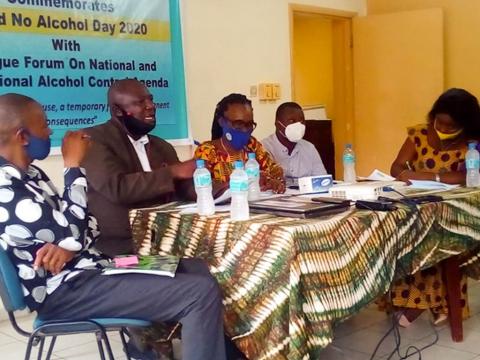By Kemo Cham
Campaigners for an alcohol free Sierra Leone have commemorated this year’s World No Alcohol Day (WNAD) with calls for acceleration of efforts to introduce a policy to control the consumption and abuse of the substance.
The Sierra Leone Alcohol Policy Alliance (SLAPA), which comprises various civil society organizations, envisages a society free from alcohol and its attendant consequences.
On Friday, October 2nd, the Alliance hosted a dialogue forum which brought together participants from the various partner organizations to discuss progress in the efforts to introduce the police. The event, which took place at the Grassroots Gender Empowerment Movement (GGEM) at John Street in Freetown, was the culmination of a series of activities organized by the alliance at district level, according to a news dispatched sent to Politico.
The lack of a policy, among numerous factors, means that data on alcohol consumption locally is hard to come by. But figures from the World Health Organization (WHO) point to a grim future globally, with regards the effect of alcohol consumption and abuse. It shows that 3.3 million people die worldwide every year due to abuse of the substance. This figure also means that every 10 seconds a human being dies because of alcohol.
The WNAD was declared by the World Health Assembly (WHA) in 2008 to be observed every October 2nd with the goal of raising awareness against alcohol misuse.
The SLAPA has commemorated the day since 2015, when the alliance was established, in collaboration with the community development agency, FoRUT.
Friday’s event, which brought together state and non-state actors to discuss the National and International Alcohol Control Agenda, was convened on the theme: “Alcohol misuse, a temporary fun with permanent consequences.”
Presentations were done on the World Health Organization (WHO)’s SAFER Initiative, which was promulgated in 2018 with the goal of controlling and reducing harm from alcohol, as well as the current national efforts for reducing harm from alcohol.
Michael Alex Conteh, an official from the Non-Communicable Disease and Mental Health Directorate of the Ministry of Health and Sanitation (MoHS), told the forum that progress was been made in efforts to get a policy.
“The Alcohol Control Technical Working Group, which is leading in developing a policy and legal framework on alcohol control in Sierra Leone, reports to the Non-Communicable Disease and Injury Commission of MoHS and has incorporated alcohol control measures into the draft NCD Policy and Strategic Plan and we shall be moving ahead for a stand-alone alcohol policy,” he announced.
Activist, Isatu A. Sesay, who is the Executive Director of Talented Young People Everywhere (TYPE) and a Board member of SLAPA, said dealing with alcohol abuse is crucial in Sierra Leone’s efforts to solve other societal menaces, including Sexual and Gender Based Violence.
“We cannot keep focusing on tackling Gender Based Violence without addressing one of the root causes of it, which is alcohol misuse,” she said.
Alcohol is one of the cheapest consumables in Sierra Leone, despite the danger associated with its. And the lack of a policy controlling its manufacture and distribution means that it can been accessed everywhere, even by children.
Campaigners say alcoholic contents in brews, particularly the local brands, are usually unacceptably high.
“Alcohol is sold everywhere, I have seen children either buy or sell alcohol, which is unacceptable, there is a need to regulate how alcohol is produced, sold and consumed in this country,” lamented Ibrahim Kargbo of the National Drug Law Enforcement Agency (NDLEA).
For Hajie Bah, Coordinator of the Network Movement for Youth and Child Welfare, there is hope for the future given the ongoing dialogue.
“I am confident that we shall one day have strong alcohol regulation in Sierra Leone because of the existence of the National Alcohol Control Technical Working Group at MoHS,” Bah, who is also the PRO of SLAPA, told the audience.
Copyright © 2020 Politico Online








